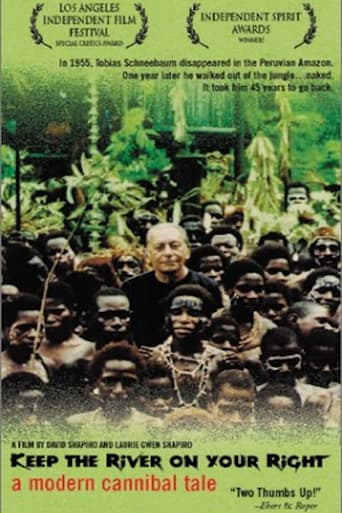

"In 1955, Tobias Schneerbaum disappeared in the Peruvian Amazon. One year later he walked out of the jungle...naked. It took him 45 years to go back." Supposedly, "Keep the River On your Right" is "a modern cannibal tale". In reality, anyone looking for some insight into cannibalism will be sadly disappointed. The first half of the movie is more like a travel log of New Ginuea, mostly touting the native art. The second half relies on still photos of a Peruvian cannibal tribe, but really that's about it. Unless of course, you are interested in home movies of a Jewish wedding, or Schneerbaum introducing his former male lovers. I give up. Big disappointment and not really "a modern cannibal tale." - MERK
... View MoreDocumenting a documenter. That's one way to describe Keep the River on Your Right: A Modern Cannibal Tale. This film follows anthropologist Tobias Schneebaum, who in his late 70s went on a journey back to the places he spent time as a participant field researcher over 40 years ago, first to West Papua and then Peru. Tobias is a full-bodied character: a gay Jewish artist anthropologist who eeks out a living on a cruise ship teaching gawking tourists about the cultures he has come to have a deep respect and understanding for. Author of several books documenting his time with both the Asmat people of West Papua and the cannibalistic Amazonians in Peru, Tobias has been haunted by what happened in his time in these places and how intimate his connection and relationships had become. Yet Tobias' constant wonder and appreciation for the places he got to know is admirable and a real pleasure to watch. One can only hope to ever achieve and retain such humility themselves.Tobias makes a compelling subject for study as the experiences he faced in immersing himself in these two tribal societies has left him fundamentally changed. This film challenges the notions of morality and "naturalness"- e.g. nudity, homosexuality, cannibalism. (Watch for the graphic circumcision scene). When questioned as to why he engaged in some of the local practices that others would morally denounce, his non-judgmental nature asks: "Why Not?" Who is to say the way of other cultures is right or wrong? This little sleeper is a must watch for not only National Geographic types, but also those interested in the art of documentary making. This film shows what can be done shot on video. The editing provides a quiet revelation of Tobias' life that leaves you watching in fascination. At times, he despairs at being pushed by the film crew to make the emotional journey back, especially considering his age and physical frailty. We can be but grateful that Tobias allowed the tables to be turned on himself, perhaps sympathising with the desire to understand humanity and one's place in the world. The filmmakers provide some moments of critical balance, presenting for example one anthropologist who believes that Tobias predetermined his findings (of homosexuality in this case) based on his personal interests. That said, you can't decide when to stop being shocked and when to take this man home for a cuddle. Move over River Queen, this is the best river ride I've taken in a while.
... View MoreIt's rare that you see a documentary as well balanced as this movie. The blend of Tobias's daily life with his adventures in Peru really show both sides of the man. In truth he is a very simple person, but for whatever reason his life sends him visiting ancient cultures in South America. He is a man of many contradictions.While the movie is about Tobias overally, it provides interesting commentary on a number of subjects: loss of culture, aging, homosexuality, even a little commentary on the voyeuristic act of the documentary itself. It's this richness of information that makes the movie so compelling.Unfortunately the filming style is high-handed and sometimes is disruptive. It breaks the old adage that the best camerawork is the kind that is not noticed. Throughout the movie there are annoying closeups and jerky camera movement that is more distracting than useful.Overall, I highly recommend this movie. I'd give it a 9 out of 10. The film style is annoying but the story is first rate. You won't be disappointed.
... View MoreAfter receiving both the original book and passes to the film I was pleased to see the ever lasting effect a year with natives in Peru can have on a person. It is one thing to be actually in that moment and appreciate what a life changing event is taking place, but it is another to actually continue to live with the effects that it can have on you for decades to come. Perhaps it is a curse to actually become another person with a totally different identy only to return to a world that could never understand your actions and motives while in the moment, but I beleve that Tobias understood the life-long effect that it would have on him, both positive and negative.Tobias came across, in the book as well as the film, as a man who was longing for something that he didn't quite know what. And until his return 45 years after leaving the tribe I didn't sense any closure on his part for the "family" that he left behind. The "civilized" world's inability to comprehend his actions while there only added to this sense of an unfinished chapter in the original book. The film alone is a beautiful story about a man coming to terms with himself and his enviroment, but with Tobias' book it is a complete journey into one man's quest to find himself. Read the book first to fully appreciate a stunning film.
... View More